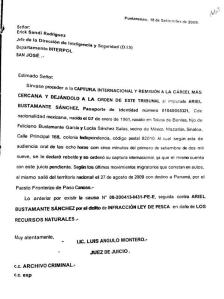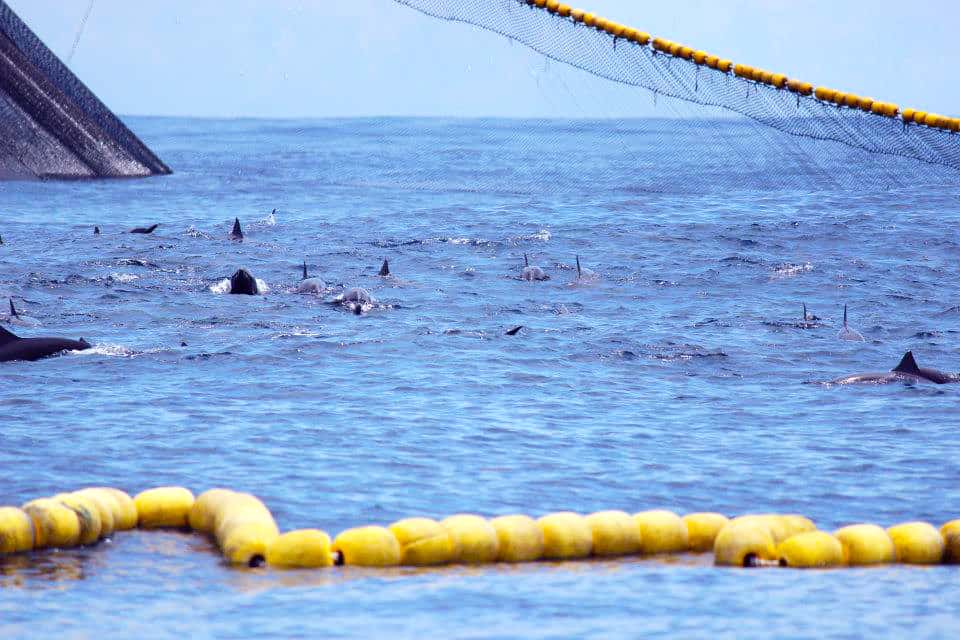A Mexican fishing boat captain busted in 2008 with 12 tons of tuna well within the protected boundary waters of Costa Rica’s Isla del Coco National Park fled the country before his trial and has never faced justice.
Ariel Bustamante Sánchez, 53, a Mexican national, was captain of the Tiuna fishing vessel when it was caught by Costa Rican officials 9.5 nautical miles northeast of Manuelita Island, part of Isla del Coco, with a massive load of tuna, making it the biggest poaching case in the national park’s history.
Located 365 miles off Costa Rica’s Pacific coast, Isla del Coco is known as the country’s “Treasure Island” and is a UNESCO World Heritage Site. It forms part of an important marine biological corridor that connects with Ecuador’s Galápagos Islands.
However, for decades park rangers have been outnumbered by poachers, who continue to fish the park’s waters mainly for tuna and sharks.
Bustamante’s boat and helicopter were seized, and he was issued a court date to face charges of violations of the country’s Fishing Law. But he fled the country through Costa Rica’s southern border crossing at Paso Canoas just days before his trial, immigration records show.

On Sept. 10, 2009, a judge issued a formal request to then head of the Department of Intelligence and Security, Erick Sandí, asking Interpol to issue an international arrest alert for Bustamante. But according to a search of the Interpol website on Wednesday, there is no record of any such alert. The Tico Times is verifying that Interpol received the request from the judge.
According to a story in the daily La Nación at the time of his arrest, Bustamante faced a $5 million fine, a criminal trial, and the seizure of his boat. However, after the vessel was impounded for approximately two years, Bustamante, or one of his representatives, was allowed to recover it and remove it from the country, his attorney, Víctor Herrera, told The Tico Times.
According to Herrera, the Costa Rican Fishing Institute, or Incopesca, was tasked with the boat’s maintenance while impounded, but Incopesca lacked the funds for its upkeep. Herrera said both Incopesca and the Prosecutor’s Office agreed to release the boat to its owner. Herrera added that his client recovered the vessel in poor condition, and the fishing company Bustamante represents had to pay for its upkeep while impounded.
According to Bustamante’s attorney, the Tiuna captain returned to Costa Rica to face trial in 2009, but days before he was to appear in court, prosecutors upgraded charges against him from violations of the country’s Fishing Law to piracy. If convicted of Fishing Law violations, Bustamante likely would not have served jail time. Charges of piracy, however, carry a maximum penalty of up to 15 years in prison.
“My client didn’t feel he could trust the Costa Rican justice system – how could he if they changed the charges on him days before the trial – so he fled,” Herrera said.
Update, Wed., March 19, 6 p.m.: A Puntarenas assistant prosecutor responds to Herrera’s statements:
For Puntarenas Assistant Prosecutor Tatiana Chaves, Herrera’s statements are “absurd.”
“The facts of the case remain the same: He was illegally fishing inside Isla del Coco National Park. It’s illegal to fish inside the park,” Chaves told The Tico Times.
Chaves also disputed the attorney’s claim that poaching inside a national park does not fall within the legal definition of piracy in Costa Rica. “Yes, it’s piracy,” Chaves said. “But regardless, the accused must appear in court to face the charges. You can’t just run.”
Chaves also acknowledged that Bustamante’s tuna boat was so large, that it was impossible for the Costa Rican government to finance its upkeep. Prosecutors and Incopesca let the boat leave under the condition that it must return whenever a judge so orders. Also, Chaves said, Bustamante had to pay a bail of approximately $250,000, which he lost when he fled.
As to whether or not Interpol ever issued an alert for Bustamante’s arrest, Chaves said Puntarenas’ chief prosecutor on Wednesday sent a request to the judicial branch in San José asking for confirmation that judge Luis Angulo sent it in the first place, in September 2009. The Tico Times asked a spokesman at the judicial branch for the same information, and will update the story once we receive it.
The original story continues here:
Conservationists are outraged that such a big case of alleged poaching could result in total impunity, particularly given Costa Rica’s aggressive effort to internationally pursue Sea Shepherd founder Paul Watson and have him extradited to this country on charges of attempted shipwrecking over a 2002 incident off Guatemala’s coast.
Asked why he thought Costa Rica would so aggressively pursue him and not Bustamante, Watson told The Tico Times in an email:
“The difference is that Bustamante is a poacher and I am a conservationist and under Chinchilla’s government conservationists were criminals and poachers were business associates. Bustamante is a criminal and the case against me is political because anti-poaching has been a crime and poaching has simply been good business as long as the right people got their cut.
Strangely, both Watson and Bustamante’s attorney agree on one point: The Costa Rican justice system is flawed, they say.









